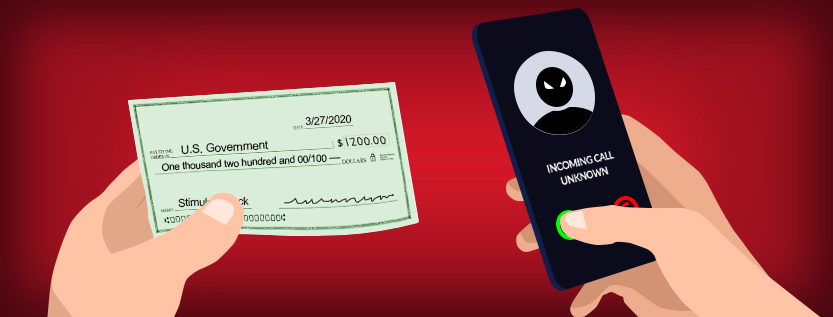Stimulus Check Scams
President Donald Trump signed a Coronavirus Aid plan that would guarantee millions of Americans stimulus checks from the government.
Although many may see this as a positive, there are scammers looking to profit off this plan. Remember there is no sign-up required to receive the stimulus check. The process is automatic for all qualifying Americans.
How Will I Be Contacted?
The IRS always contacts taxpayers through traditional mail. Therefore, if you receive a phone call, email or text message from an “IRS official” stating you need to apply or register, it’s likely a scam.
The treasury department makes it clear on their website: “If you receive calls, emails, or other communications claiming to be from the Treasury Department and offering COVID-19 related grants or stimulus payments in exchange for personal financial information, or an advance fee, or charge of any kind, including the purchase of gift cards, please do not respond.”
How Much Will I Receive?
Americans will receive up to $1200 per person in the coming weeks and parents will receive an additional $500 for each child under 17 years of age.
Furthermore, the IRS clarifies that the agency will post any additional information when it’s available at IRS’ website.
How Will I Get The Stimulus Check?
Those who file their tax returns electronically and provide the IRS with their bank information will likely get their payments earlier via direct deposit. Some 88% of individual returns were filed electronically in 2018.
Individuals who file their tax returns electronically get their payments earlier through direct deposit.
What if I Don’t Have Direct Deposit?
Those who did not provide the IRS direct deposit information on their 2019 or 2018 tax return will get that opportunity in a new government online portal. This way, citizens won’t have to wait for the check in the mail.
Paper checks are expected to take longer to arrive.
However, details about this online portal have not been released. Until the IRS releases an official web address and further guidance, don’t give out your personal banking information online.
What Types of Scams?
Scammers are taking full advantage of Americans’ financial vulnerability right now.
Details regarding the portal have not been made public, however. So, until the IRS releases more information on the website provided above, don’t give out any personal information.
Scammers target financially vulnerable people the most. The greater the desperation the easier it is to extort and manipulate them.
There have also been reports of fake checks going around. However, if one is informed they have a better chance of not falling victim to these scams.
How Do I Know I’m Being Scammed?
Any and all checks delivered by mail now are scams or fraudulent. It will take the government at least a few weeks to mail out considering the bill was only passed Friday, March 27.
Additionally, any check you receive in the mail that requires online verification or contacting a given number is also fake. Be skeptical of checks for odd amounts of money, specifically checks with a cent amount.
The government stimulus will be for an even amount of money regardless of the amount received.
What Kinds of Scams should I Expect?
Any emails with suspicious links, text messages or even voice messages you receive regarding payment is probably a social engineering scam. If you receive an email that fits the description above, don’t open anything. Simply file a complaint with the FBI or Federal Trade Commission.
This applies to businesses as well. If you are working remotely and find yourself reading an email regarding the stimulus check, contact your IT department immediately. It is always better to be safe than sorry.
According to CNBC report, coronavirus phishing scams are rising.
The Federal Trade Commission and Federal Deposit Insurance Corp. issued warnings for Americans to be keep aware of cybercriminals who attempt to steal form users with COVID-19 related content.
Scammers work best when they hide behind legitimacy. Therefore, they use headlines, current events, trends and personal information to trick victims into giving up valued information.
Stoking fear and uncertainty is a tried and true method of manipulating a victim. Capitalizing on ignorance is the best method.
Those who don’t keep up with the news or are unclear about the specifics of the stimulus plan passed by President Trump’s administration are likelier to make a mistake than those who aren’t.
What Do These Attacks Look Like?
Scammers launch phishing attacks, through email and text to take advantage of those who have received checks. Often, these messages appear authentic, usually with a call-to-action such as “download our guide to using check” or “Get your money now, click here.”
If you are currently working remotely, contact your fellow employees, team members or IT department to verify any and all emails received. Have a strong cyber security plan in place. There is strength in numbers and communicating doubts is the best way to deal with uncertainty.
Make sure you have a VoIP system in place to coordinate and communicate with your team, employers, or IT department at all times. This could be Skype, Zoom or any other online communication system.
Hackers are using this time of social distancing and isolation to their advantage, hoping that victims won’t verify the phishing emails they send out.
Having a reliable network of trusted experts or peers is good way to protect yourself from falling into one of these scams.




